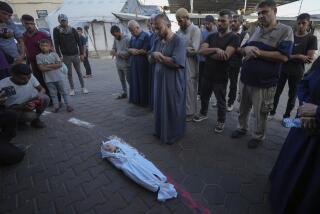Gaza dark amid Israeli blockade
GAZA CITY — The Gaza Strip’s only electric power plant shut down Sunday evening after Israel halted the shipment of diesel that fuels it, plunging most of this city into darkness and threatening such vital services as hospitals, bakeries, water supply and sewage.
Many of Gaza City’s 400,000 inhabitants rushed to stock up on candles, batteries and bread, trudging up and down stairs as elevators ground to a halt, and then shivered through a night of temperatures in the low 50s.
Israel sealed all crossings into the coastal strip Thursday because of an increase in rocket attacks by Palestinian militants in Gaza. That ended the flow of industrial diesel fuel, along with basic food supplies and other humanitarian aid not previously affected by Israel’s suspension of most commerce with Gaza last year.
“There is no fuel coming in and we have no reserves,” Kanaan Abeid, deputy chairman of the Palestinian Energy Authority in Gaza, said in announcing the 8 p.m. shutdown.
The power plant supplies electricity to 70% of Gaza City and about one-third of the Gaza Strip, which has a population of 1.5 million. The rest of the enclave’s electricity comes directly from Egypt and Israel, but a technical problem has reduced the supply from Israel over the last week. Officials in Gaza said as many as half of Gaza’s homes were hit by blackouts Sunday.
The U.N. Relief Works Agency, which distributes food to much of Gaza’s population, joined human rights organizations in condemning Israel for what they called collective punishment.
Arye Mekel, an Israeli Foreign Ministry spokesman, said those groups should direct their criticism at Hamas, the Islamic movement that governs Gaza, and other militants that fire rockets toward Israel.
“The ball is in their court,” Mekel said. “If they stop the rockets today, everything would go back to normal.”
Gazans angrily rejected that position.
“Do you really believe the rockets will stop because of this blackout?” Monzer abu Ramdan, a 56-year-old supermarket owner, said as he worried about the dairy products in his disabled refrigerated sections. “The Israelis are just punishing innocent civilians.”
A Hamas spokesman, Sami abu Zuhri, said the group would not halt its attacks.
The Israeli Foreign Ministry issued a statement alleging that power was still flowing to Gaza’s rocket-making facilities. It questioned the severity of the fuel shortage and suggested that “propaganda considerations” were behind Hamas’ decision to shut down the plant.
But Sari Bashi, executive director of Gisha, an Israeli human rights group, said the plant ran out of reserves Jan. 5 and had been operating since on dwindling supplies of incoming fuel. Gisha has been fighting in Israel’s Supreme Court against the cutbacks to the plant, which started last October in response to rocket attacks.
The British aid group Oxfam issued a statement Sunday calling the fuel cutoff “ineffective as well as unlawful.”
Gazans spent the day preparing for a shutdown after one of the plant’s two generators stopped working in the morning.
Bakeries lost power, prompting a run on dwindling bread supplies. Power plant employees worked frantically to redistribute electricity coming from Israel, shifting it to neighborhoods that were going dark.
There was no sign of panic. Gazans have been living with fuel cutbacks, power outages and shortages since Hamas, which calls for Israel’s destruction, seized control of the territory in June, driving out rival Fatah, after an attempt at a unity government collapsed.
But many in Gaza said they believed the deprivations could soon get far worse.
Gaza’s Health Ministry warned that the fuel shortage was crippling backup generators at Shifa, the city’s main hospital. Oxfam said its Gaza partner, the Coastal Municipalities Water Utility, had enough backup power to pump drinking water and treat sewage only until Tuesday.
“Everything depends on electricity -- pumping the water, heating the water, treating the waste,” said Wissam Haj, 27, a graduate student whose sixth-floor apartment had no water Sunday and who was searching for an Internet cafe with electricity so he could finish a freelance project on his laptop.
“Every detail of our daily life is affected, and it makes me angry,” he said.
Palestinian Authority President Mahmoud Abbas, who is engaged in U.S.-backed peace talks with Israel, urged the Jewish state to open crossings to Gaza but also warned Palestinians not to give Israel “the justification it needs to pursue its aggression and siege.”
The blackout in Gaza City prompted hundreds of residents to stage a candlelight protest march in the city center. People in West Bank cities, where Abbas’ Fatah movement holds sway, held similar marches to show solidarity with Gazans.
Rocket attacks from Gaza have kept the town of Sderot and other Israeli communities under siege. The attacks escalated after an Israeli raid Tuesday killed 16 militants.
More than 200 rockets and mortar rounds have hit Israel since then, causing panic but no serious injuries. Four rockets exploded Sunday in Israel, a significant drop from the level of last week. An Israeli airstrike killed at least one Palestinian in northern Gaza, according to medical workers.
--
Special correspondent Abu Alouf reported from Gaza City and Times staff writer Boudreaux from Jerusalem.
More to Read
Sign up for Essential California
The most important California stories and recommendations in your inbox every morning.
You may occasionally receive promotional content from the Los Angeles Times.










